RBC faced tougher opposition than ever as dozens of Indigenous leaders, climate activists and their allies from across North America descended on Toronto to confront CEO David McKay on the bank’s role in fuelling the climate crisis.
On a rain-soaked Thursday morning, the constellation of advocates gathered to protest RBC’s continued backing for fossil fuel projects. They included Wet’suwet’en leadership fighting the Coastal GasLink pipeline in northern British Columbia, organizers in the Gulf Coast fighting a petrochemical boom, a citizen of the Occaneechi Band of the Saponi Nation fighting the Mountain Valley Pipeline in Appalachia, and others.
They filed unobstructed into a large room at the Toronto Congress Centre for the bank’s annual general meeting. Two years ago, Wet’suwet’en hereditary leadership challenged RBC execs virtually after the bank abruptly cancelled the in-person AGM and last year, RBC wouldn’t let the chiefs into the same room, leading to accusations of racist segregation.
This year, Wet’suwet’en leadership was joined by the largest contingent of allies to date. The fight against RBC has officially grown into an international, multi-racial, multi-generational movement.
“People are going to stand up when people are oppressed and I think in this moment, we're realizing that we can't turn away from what's happening with the climate,” said Celine Isimbi, a University of Waterloo student and organizer with Change Course.
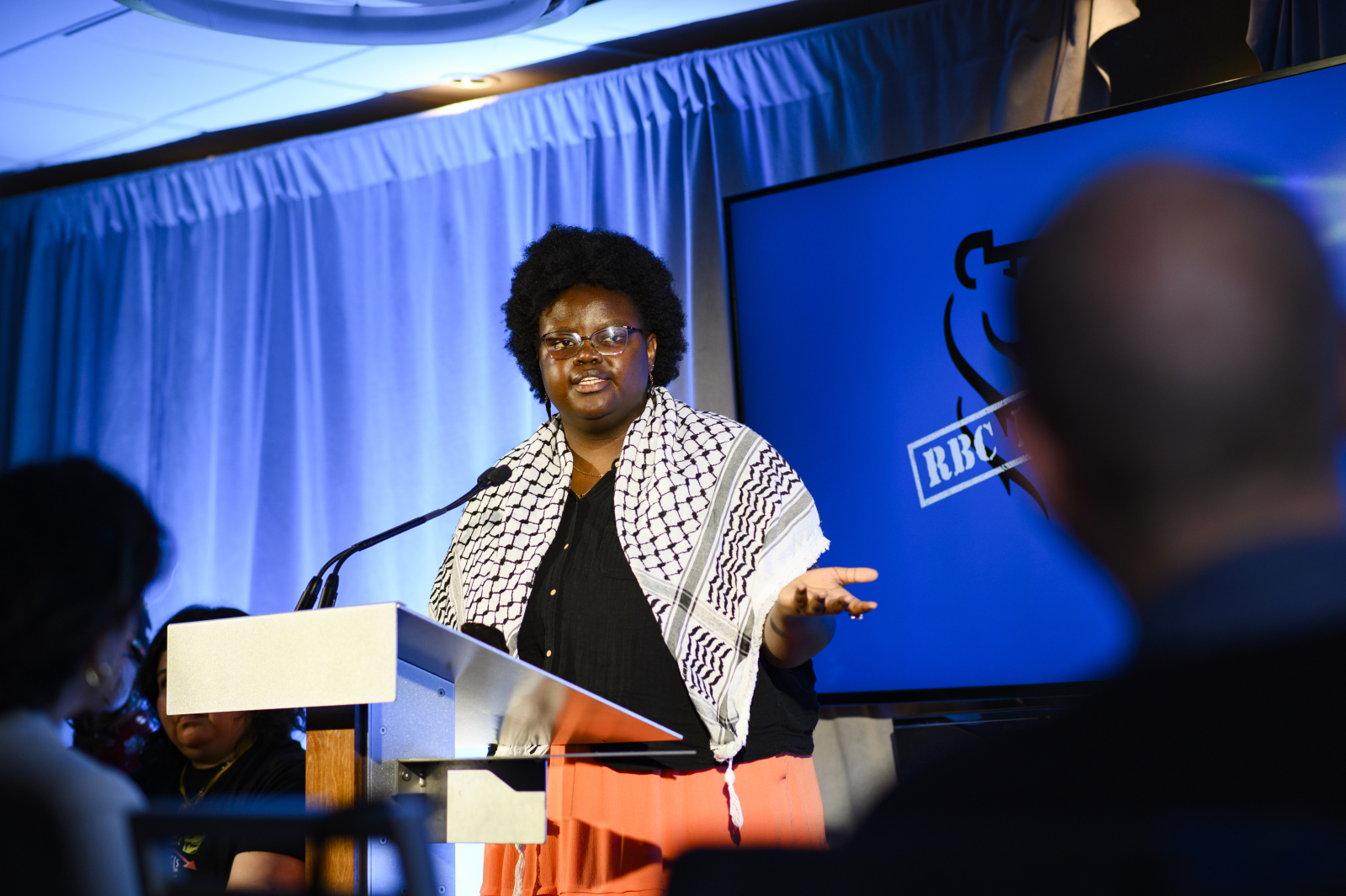
Inside the meeting hall, the Indigenous leaders and activists joined shareholders to vote on proposed shareholder resolutions aimed at improving the bank’s climate performance and respect for Indigenous rights — all of which were rejected on the bank’s recommendation to shareholders. Outside the convention centre, allies gathered next to an inflatable head of McKay that read, “RBC is Burning Our Future.”
The activist shareholders and their proxies tried to ask McKay questions, but he did not answer any of them head-on. Instead, speakers who were only given 60 seconds to talk were often interrupted and had their microphones cut off, sometimes before their minute was up, while McKay frequently deflected and offered his rationale for the bank’s decisions instead.
“A bank can only operate in the construct of the society and economy it operates in … and, therefore, we can’t get too far ahead of where our own countries are going,” he said. “We all agree on where we’re trying to get to as a society and we’re still debating how.”
McKay also pointed to RBC’s recent commitment to grow its “low-carbon” energy lending to $35 billion by 2030 as evidence the bank is taking climate change seriously.
Except, the climate science is unequivocal that burning fossil fuels must be phased out rapidly if the world is going to avoid catastrophic warming. It is not enough to scale up clean lending if dirty lending isn’t phased down too.
Unless planet-warming greenhouse gases, which are overwhelmingly caused by burning fossil fuels to power our vehicles, heat our homes, and industry, are stopped completely, the Earth’s temperatures will not stabilize, experts say.
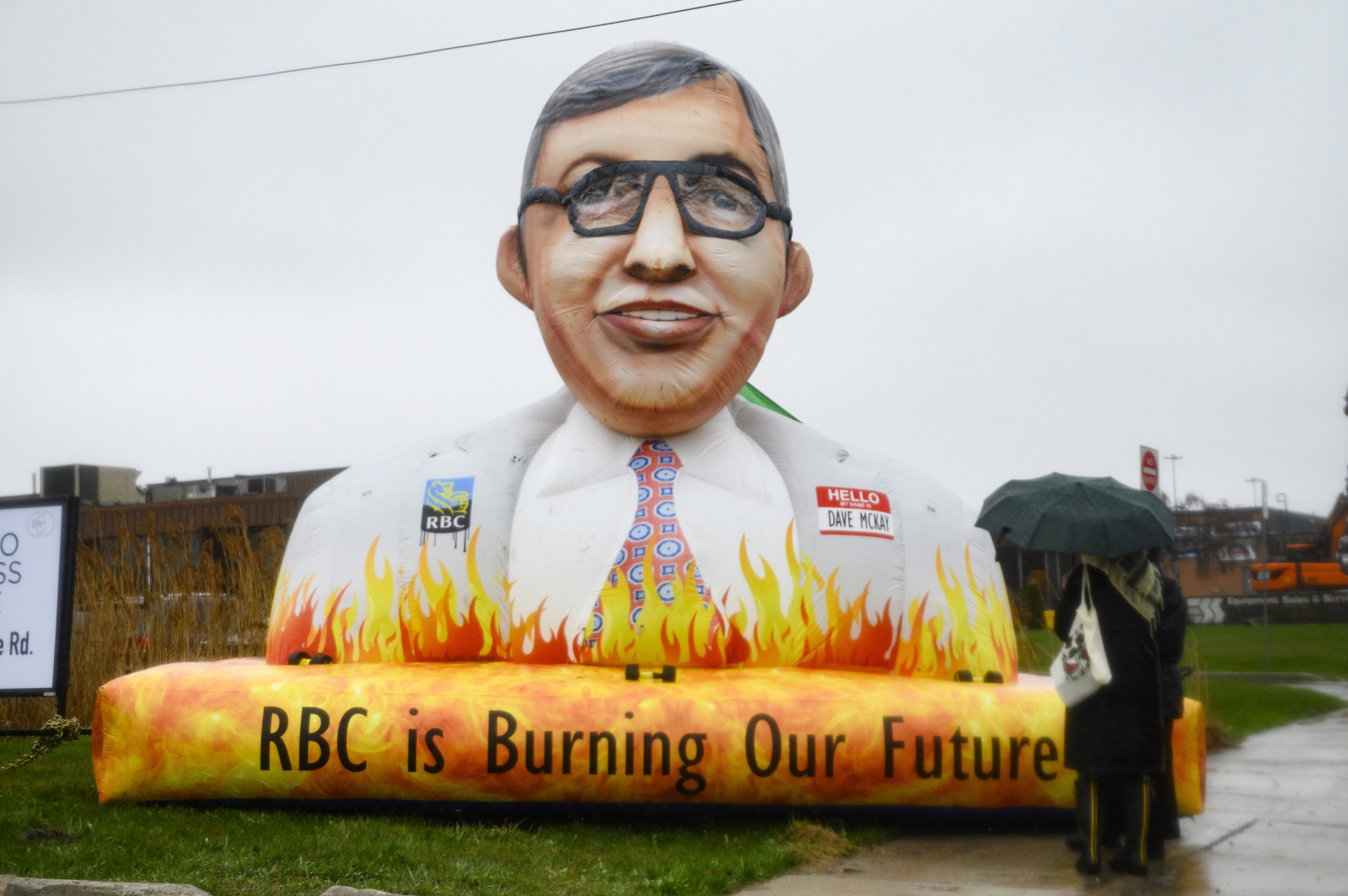
McKay did not acknowledge the need to phase out fossil fuels. And critics say RBC can’t be a genuine leader until it ends those investments. Anything else is a dereliction of duty, according to Stand.earth’s climate finance director Richard Brooks.
“We need Canada's biggest bank, its largest corporation, to drive the energy transition. To be in the driver’s seat and not to be in the trunk,” said Brooks.
“For every dollar [RBC puts] into dirty fossil fuels, only 37 cents is going into low-carbon energy and renewables when the ratio needs to be 4:1 of renewable to fossil fuel lending by 2030, he said. “Simply addressing one side of the equation is not enough.”
RBC’s target of $35 billion into low-carbon energy by 2030 implies a 1:1 ratio if its fossil fuel lending holds to current levels.
According to Brooks, RBC is one of the largest “greenwashing banks” in the country, and McKay’s statements are verging on breaking the law.
“When a CEO issues statements that are intentionally misleading, that are intentionally deflecting, you are getting very close to a violation of securities law [and] you're getting very close to a violation of competition law,” he said, adding RBC is the only bank under investigation by Competition Bureau Canada for allegedly misleading Canadians about its climate performance.
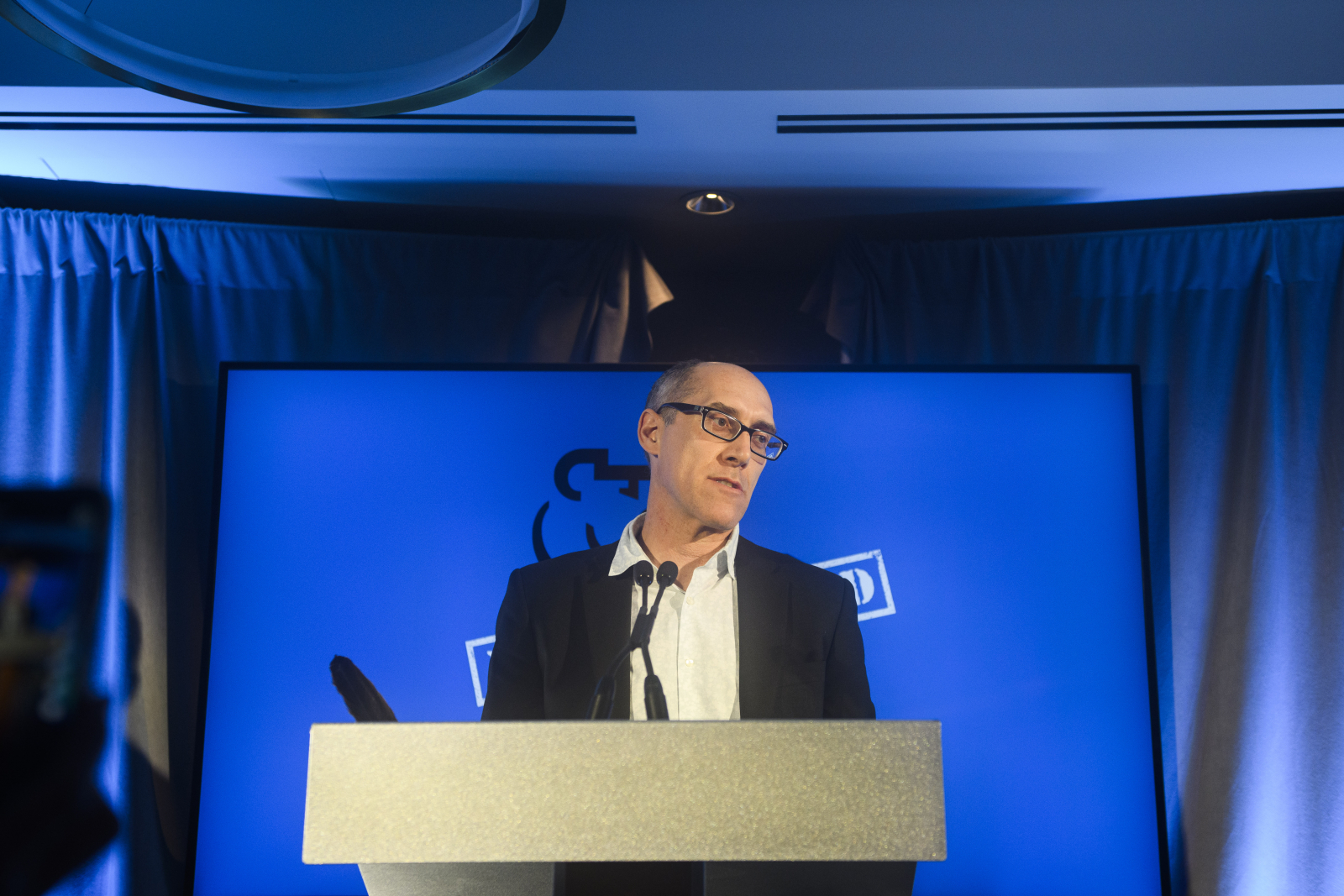
Critics of RBC focused their attacks in two ways. One was to highlight the bank’s reputational risk when it lends to companies violating Indigenous rights, like the failure of Coastal GasLink to secure consent from the Wet’suwet’en hereditary chiefs before it built a fracked gas pipeline through the nation’s territory. The other was to underscore the bank’s sorry climate performance, given it is the country’s top financier of fossil fuels and ranked as the second largest among all the world’s banks, according to the Rainforest Action Network’s updated Banking on Climate Chaos report.
McKay swatted away critics of the bank’s treatment of Indigenous rights, noting Coastal GasLink, a pipeline expected to carry 2.1 billion cubic feet of natural gas per day to the LNG Canada Kitimat facility for export, won approval from band councils — an irrelevant point, considering the Wet’suwet’en hereditary leadership has not consented and actively opposes construction through its territory. Coastal GasLink reached agreements with some First Nations band councils along the project’s route, including Wet’suwet’en bands. However, hereditary Wet’suwet’en chiefs oppose the project, and it is the hereditary chiefs who hold authority over the land in question.
Wet’suwet’en hereditary Chief Namoks said RBC is “only looking at the bottom line, but that bottom line is killing us.”
“Reconciliation can’t happen at the barrel of a gun,” he said, referring to three major RCMP raids into Wet’suwet’en territory in recent years where opponents of Coastal GasLink were arrested.
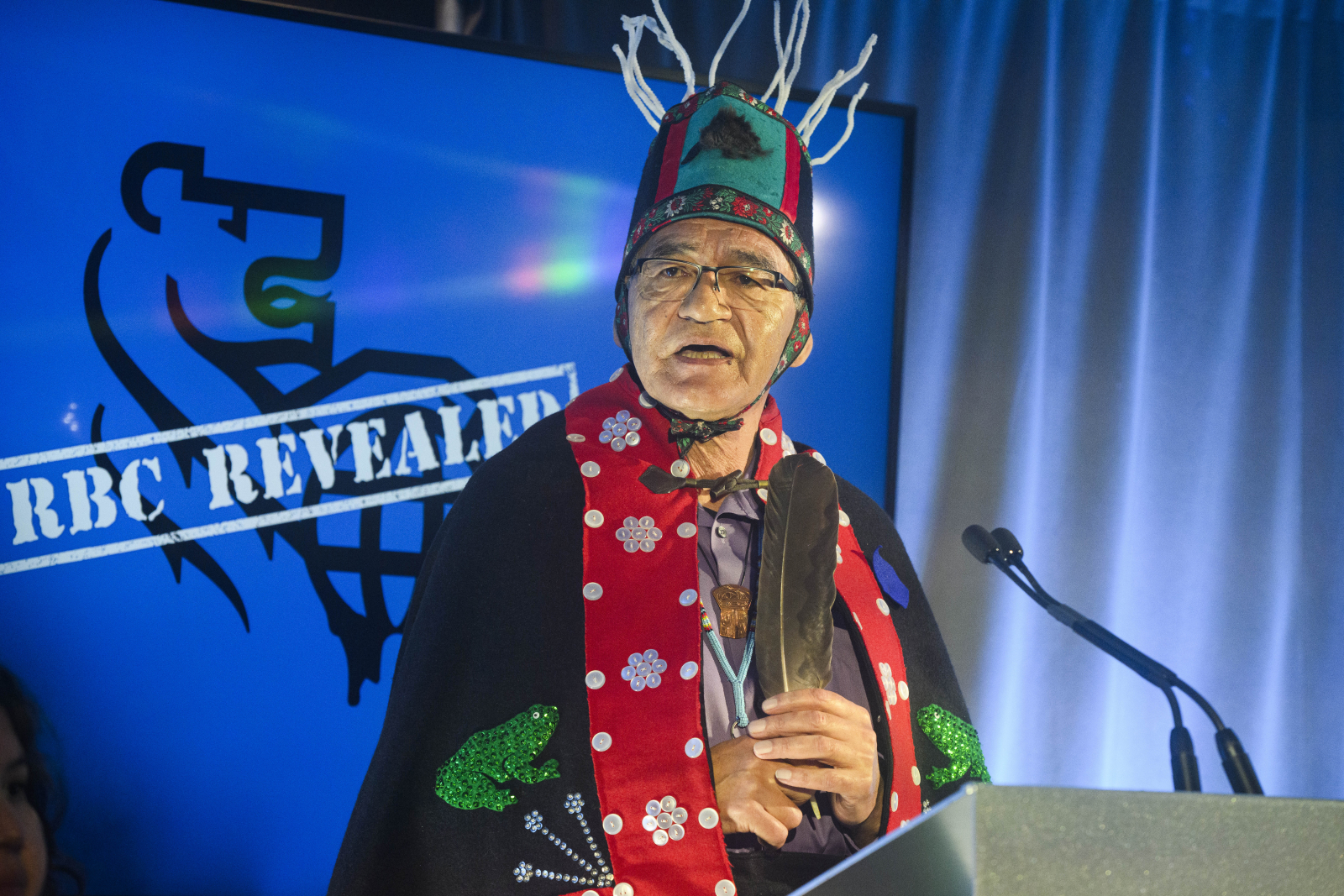
Union of British Columbia Indian Chiefs Grand Chief Stewart Phillip called McKay’s comments a “manipulative … distortion of reality.”
McKay said Coastal GasLink “was an incredibly successful project, it had full support, and it was the right decision to make. And we all know that's just not true,” Phillip said. “For goodness sake, there was a war up there. It was global in nature… People were outside embassies all around the world with placards supporting the Wet’suwet’en people.
“I believe as the climate crisis intensifies … people are going to look for somebody to hang liability on, and they're going to look as far as oil and gas and also the banking and financial institutions that made these projects possible without ensuring the proper standards were met,” he added.
Of seven shareholder resolutions voted on at the meeting, four related to climate change. RBC urged its shareholders to shoot down every proposal.
Brooks said it’s clear the public can’t rely on the voluntary action of banks and the federal government needs to step in to regulate them into action.
I do not understand how a
I do not understand how a bank can be chartered by Canada and not be constrained to follow the objective of the country, our international obligations.
RBC begins to ct like the
RBC begins to ct like the overweening arrogance of major scofflaw US Banks. No greater insult is possible - except to call RBC out on its quasi criminal money laundering habits. Mackay presents himself as totally above the fray, completely un-interested in the opinions and the facts presented by others. Such hubris is certanly of Olympian proportions. When his Board finally loses confidence in him - I hope they strip him of all his unearned entitlements
"Their inability to empathise
"Their inability to empathise, their lack of genuine interest in the ideas and feelings of others, and their unwillingness to take personal responsibility for their behaviour and actions makes them very difficult people to be with. They are never satisfied. Greedy people look at the world as a zero-sum game.
RBC, the epitome of greed and apathy, hopefully Canadians will wake up to your lies and bullsh*t sooner than later.

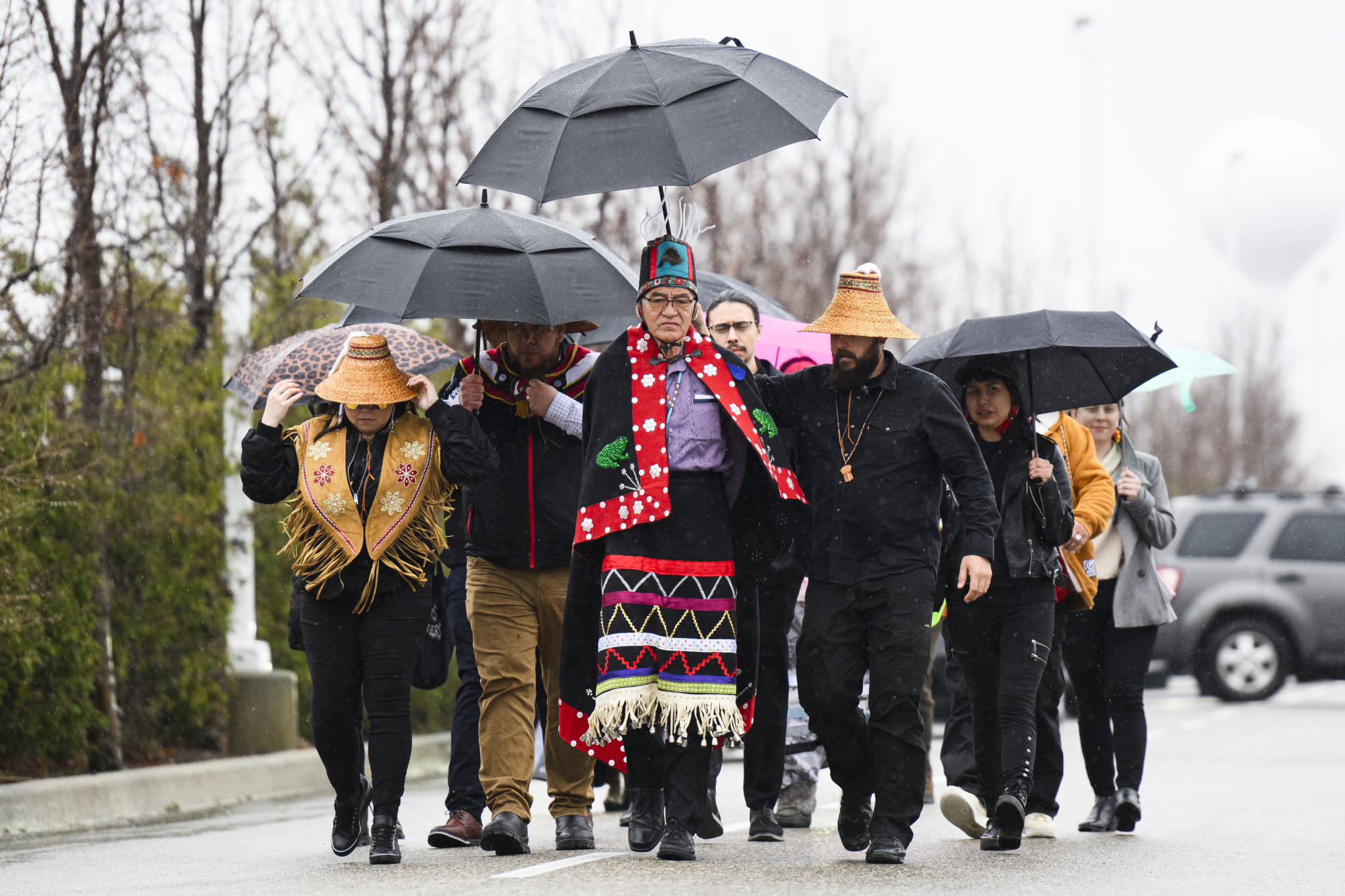


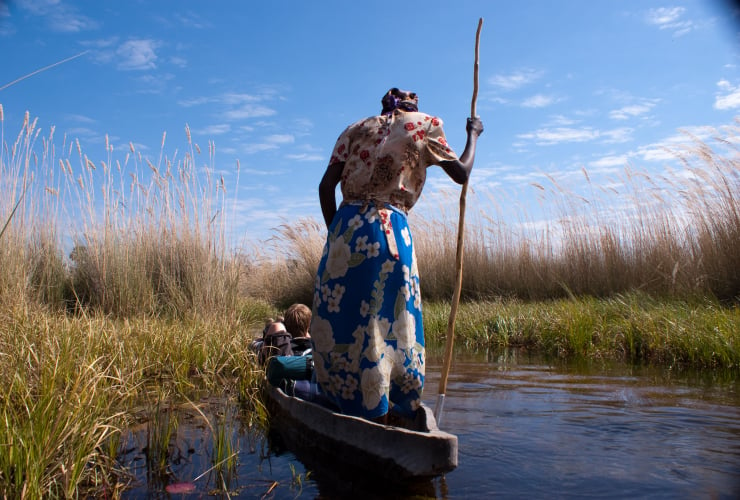

Comments